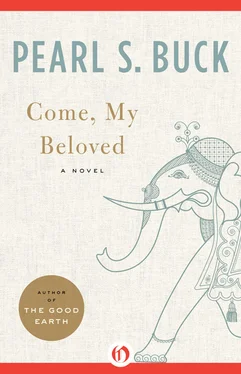He was compelled to acknowledge, as they reached the blue and gold drawing room, that the Englishman and his wife were worthy enough of their position. Titled in their own right, both tall and equally blond, they carried themselves with a simple and powerful dignity which he could not but admire, and could not but acknowledge, too, was not to be found in his own country. Only men and women who had lived for generations above competition could maintain such serene confidence in what they were. In his own country all were subject to competition. He himself had fought and struggled to reach his present height, and it would be impossible for him to pretend either to dignity or serenity. Such dignity as he had was the result of sheer physical mass, his six feet three now the more imposing because he was no longer the slight fellow he had been when he was young, although he had kept his figure well enough. He wore his London suit of tropical pongee with sufficient ease, and David was handsome in white linen. He saw the Marquess look at his son again and again and at last she forgot her remoteness and motioned to him with a wave of her long narrow jeweled hand to come and sit on the sofa beside her, which David did, without appearing absurd. His mother’s sense of humor, that dark sparkling laughter which MacArd had so loved to see in his wife’s eyes, had kept their son from self-consciousness or conceit.
“Never forget that your grandfather was a country preacher,” Leila used to tell the boy, “but a very good one because he was your father’s father,” she had always added, dimpling.
“Tell me what you have chosen for your career,” the Marquess was saying to David in a sweet coaxing voice.
“I don’t know yet, ma’am,” David said. “I have just finished college.”
“College?” she repeated.
“Harvard.”
“Is it the same as Oxford and Cambridge?”
“I think so.”
She smiled at him with a distant tenderness. “And so you have no inclination?”
“Not yet, ma’am,” David acknowledged. “Perhaps this journey with my father will reveal something.”
“He can always come into my offices,” MacArd said.
“Oh, but you won’t make him?” she asked almost pleadingly.
“Certainly not,” MacArd replied. “He needn’t do anything, so far as I am concerned, although I think he’ll want to make some sort of place for himself.”
“No interests?” she asked, looking at David again.
“Too many,” he said frankly.
She refrained from more questions, her delicate reserve descended upon her again, but she rose and went to the rosewood piano and brought two large gold framed photographs.
“These are my sons,” she said.
David took the photographs, one and then the other, and looked into two thin serious faces. The photographs were finely colored and both boys were blond, blue-eyed and pink-cheeked.
“Look at those cheeks,” their mother murmured. “They couldn’t have had them here in India.”
“Oh, it’s quite impossible to keep English children here,” the Governor-General said.
His rather sharp voice served some sort of notice upon his lady and she said no more. She put the photographs quietly down on the couch beside her and motioned to a resplendent man servant to fill her small gilt cup again with coffee.
The Governor-General was talking now, explaining to MacArd the difficulties of his position, and indeed of all Englishmen in India.
“The Indians educated in English schools simply do not know the history of their own country,” he declared. “They fancy that all was peace and joy here before the British took over. As a matter of fact, the whole country was embroiled in tyranny and disunity and the common people were at the mercy of every local bully. Yet if any sensible elder Indian mentions this fact he is at once attacked on the grounds of toadying to Empire. They are determined to hate us.”
David spoke unexpectedly. “My mother would have said that they should be Christianized.”
The Governor-General was frankly surprised. “Quite the contrary,” he said coldly. “An Indian is infinitely worse when he becomes a Christian. When he forsakes his own gods he usually ends by being a scoundrel. Never trust an Indian when he says he’s a Christian — it’s become an axiom. Besides, only the lowest castes will change their religion.”
MacArd interrupted. He felt in some way that Leila was belittled by what the Governor had said. “My wife was a truly religious woman. If there were more like her in the world, we’d all be better for it, I guess.”
Nothing could be said to this and nothing was said. The Governor-General could be silent with ease, and the Marquess looked thoughtful. She said, after a moment, “Christianity is so different, isn’t it, in different people.”
MacArd got to his feet. He felt his skin hot, his hair bristle, and he restrained his impulse to defend his wife’s religion. He did not want to talk about her and he was surprised that David had mentioned her. He said to his host, “I think we ought to get on our way. My son and I want to visit the Towers of Silence. We hear it is one of the sights.”
The Governor-General rose promptly. “You should see it, by all means. Have you got your permission?”
“Is it needed?” MacArd asked.
“You must get permission from the Parsee Secretary to the Parsee Panchayat. Wait — I’ll send a man and get it for you. It will be waiting for you at the Towers.”
“Thank you,” MacArd said.
They made their farewells, he touched the lady’s hand quickly, withdrawing his own at once. Since Leila died he had found it unpleasant to touch a woman’s hand, even so coldly. But with a sudden compulsive movement, the Marquess took David’s hand in both her own. “Thank you,” she said, “thank you for reminding me of my boys.”
The Towers of Silence stood upon the top of a high hill. No roofs could be seen as they approached, for the encircling wall was high, but as they drew near, the gate of the outer temple opened, and a priest, grave and dignified in his robes, stood to receive them.
They came down from the carriage and the priest addressed them in English.
“We have received the message from Government House, Mr. MacArd, and we are happy to receive you and your son here in our sacred temples of the dead. Will you rest a while before going on?”
“Thanks, no,” MacArd said. “We will proceed, if you please.”
David looked into the tall palm trees inside the gate. Dark and sullen shapes roosted among the fronds.
“What are those?” he demanded.
“They are the vultures,” the Parsee said tranquilly. “They are very well trained. They do not come down unless the time is suitable. Even when the corpse is ready, they will not come down until the bearers are gone and they are alone with the dead. Some of the vultures are very old and they teach the young ones.”
David knew the process well enough, he had read of it, but MacArd saw his face whiten.
“Want to go on?” he asked.
“Of course,” David said briefly.
The priest described the services as he led them, moving before them with a singular grace and stillness. “The funeral services are performed at the home of the dead. The body is then put into a hearse, not in a coffin as with you of the West, but simply laid there as upon a bed, and covered with beautiful robes and shawls. In great solemnity, our priests lead the way hither and after them come the male members of the family and the friends. The dead is brought first to the outer gates, where the priests take charge. They place the dead in that temple, which you see yonder, sirs, but where I cannot lead you, for it is open only to members of our faith. I can tell you that it is very simple, and that the sacred fire burns there eternally.”
Читать дальше












